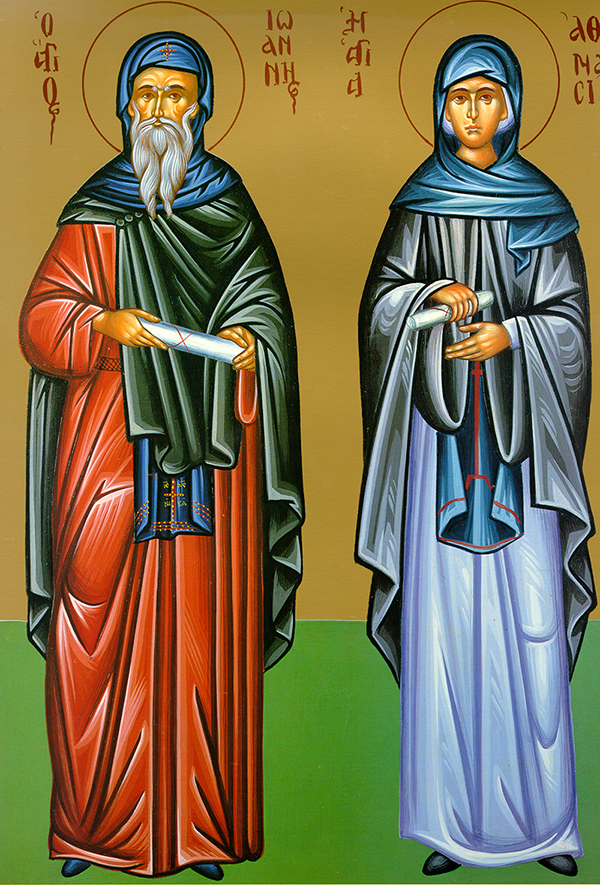

Our venerable father John was born at the end of the eighth century. At a young age he became a disciple of St. Gregory of Decapolis and accepted the monastic tonsure from him at the monastery in Thessalonica. Under the guidance of this experienced teacher, St. John attained great spiritual perfection. When the emperor Leo the Armenian (813-820) renewed the persecution against Orthodox Christians who venerated the holy icons, St. Gregory of Decapolis, St. Joseph the Hymnographer, and St. John went from Thessalonica to Constantinople to raise opposition to the Iconoclast heresy. In spite of the persecution, Saints Gregory and John fearlessly defended Orthodoxy for several years, and preached the veneration of icons. After many hardships, St. Gregory died (around 820), and soon after his faithful disciple John also departed for the Lord. St. Joseph the Hymnopgrapher transferred the relics of Saints Gregory and John and placed them in the church of St. Nicholas the Wonderworker.
Troparion
In you, O holy father John, the faithful image of God shone forth, for you carried your cross and followed Christ. You taught by your deeds how to spurn the body, for it passes away; and how to value the soul, for it is immortal. Therefore, your soul is forever in happiness with the angels.
Kontakion
Adorning your life with chastity, O father, you disciplined your body. You overcame the attacks of the foe, O blessed saint, and you presented yourself before God to enjoy the life of unending bliss as you so richly deserve, O John. Pray to the Lord for our salvation.
Epistle
Acts 8: 26-39
In those days, an angel of the Lord then addressed himself to Philip: “Head south toward the road which goes from Jerusalem to Gaza, the desert route.” Philip began the journey. It happened that an Ethiopian eunuch, a court official in charge of the entire treasury of Candace (a name meaning Queen) of the Ethiopians, had come on a pilgrimage to Jerusalem and was returning home. He was sitting in his carriage reading the prophet Isaiah. The Spirit said to Philip, “Go and catch up with that carriage.” Philip ran ahead and heard the man reading the prophet Isaiah. He said to the eunuch, “ Do you really grasp what you are reading?” “How can I,” the man replied, “unless someone explains it to me?” With that, he invited Philip to get in and sit down beside him. This was the passage of Scripture he was reading: “Like a sheep he was led to the slaughter, like a lamb before its shearer he was silent and opened not his mouth. In his humiliation he was deprived of justice. Who will ever speak of his posterity, for he is deprived of justice. Who will ever speak of his posterity, for he is deprived of his life on earth?” The eunuch said to Philip, “Tell me, if you will, of whom the prophet says this himself or someone else?” Philip launched out with this Scripture passage as his starting point, telling him the good news of Jesus. As they moved along the road they came to some water, and the eunuch said, “Look, there is some water right there. What is keeping me from being baptized?” He ordered the carriage stopped, and Philip went down into the water with the eunuch and baptized him. When they came out of the water, the Spirit of the Lord snatched Philip away and the eunuch saw him no more. Nevertheless the man went on his way rejoicing.
Gospel
John 6: 40-44
The Lord said to the people coming to him: “Indeed, this is the will of my Father, but everyone who looks upon the Son and believes in him shall have eternal life. Him I will raise up on the last day.”
At this point the people started to murmur in protest because he claimed, “I am the bread that came down from heaven.” They kept saying: “ Is this not Jesus, the son of Joseph? Do we not know his father and mother? How can I claim to have come down from heaven?”
“Stop your murmuring,” Jesus told them. “No one can come to me unless the Father who sent me draws him; I will raise him up on the last day.
Icon courtesy of Jack Figel, Eastern Christian Publications – ecpubs.com
Wednesday, April 17 –